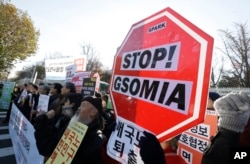A landmark Japan-South Korea military pact is drawing complaints from opponents in Seoul, who are protesting the deal and how quickly it was arranged.
Historical differences still deeply divide the two countries, and it’s unclear if a military deal will stand as a beacon of warming political ties between Korea, the former colony, and Japan, the former colonizer.
Right now, President Park Geun-hye is fighting to stay in office after being named an accomplice in a corruption scandal with elements of abuse of power and extortion. If she survives an expected impeachment attempt, analysts have said she’ll likely serve out the remainder of her term as little more than a figurehead.
Under the General Security of Military Information Agreement (GSOMIA), Seoul and Tokyo can now directly share some military intelligence about North Korea. The deal allows them to bypass the United States, which has played middleman with intelligence since late 2014.
Quick passage
In 2012, negative public sentiment derailed the signing of GSOMIA under former President Lee Myung-bak. But this week, the deal passed with relative ease following approval by Park and her Cabinet, less than a month after the defense ministry renewed efforts to approve it.
South Korean opposition parties have said they plan to file a motion at the end of the month to dismiss Defense Minister Han Min-koo for signing the deal with Japan.
Opponents of the GSOMIA, many of whom protested outside the Japanese Embassy and the defense ministry, say Park rammed through the deal at a time when the country is distracted by the corruption scandal surrounding her administration.
“[The scandal] basically created a huge black hole. It sucks in everything,” said Jong Kun Choi, a professor of political science at Seoul’s Yonsei University.
“At the end of the day, the people want President Park out of the game. Under a new administration… [opponents] believe they can somehow essentially reverse everything she made in regards to GSOMIA and things they disagree with,” he said.
Choi also said the timing calls into the question the need for the GSOMIA.
“It [the approval] naturally begs the question why now? Why in such a hurry?” Choi said. “Do we have not enough deterrence and information sharing with the U.S. vis-à-vis North Korea? If we do not have this one [intelligence-sharing deal] with Japan, are we in really grave danger?”
A recent poll by Gallup Korea found nearly 60 percent of respondents opposed the new deal.
Boosting security
But the pact comes as North Korea’s nuclear weapons program gets stronger — highlighted this year by tests of two nuclear devices and multiple long-range missiles.
Mark Fitzpatrick, the executive director of the Americas for the International Institute for Strategic Studies (IISS), said the deal signed Wednesday is long overdue.
“The fact that it happens to be now, [approval] shouldn’t raise any undue questions. The opposition to this arrangement is very shortsighted and superficial,” he said. “It’s an important cooperation vis-à-vis a common enemy; an enemy that’s getting stronger and more threatening.”
Despite Seoul and Tokyo’s new direct military link, Fitzpatrick said he’s “confident there will be no diminution in the information and the speed of information received by United States Forces.”
In Washington, U.S. Secretary of Defense Ash Carter welcomed the deal. He said it will help Washington’s two closest allies in Northeast Asia improve defenses against “North Korean aggression.”
Bad blood
The intelligence-sharing deal is by no means unique. South Korea has similar deals with dozens of countries it’s on more friendly terms with than Japan.
But for many Koreans, making deals with Japan is seen as a betrayal of country.
“We [Koreans] still have reconciliation questions at hand with Japan,” said Yonsei’s Choi. “National sentiment is really negative toward anything that has to do with cooperation with Japan, especially in terms of military issues.”
Choi also believes the deal is one piece of the U.S. alliance structure to boost its foothold in the region against growing world power China.
“I don’t think Koreans were ready to make this deal because past issues with Japan, such as comfort women, have yet to be resolved,” said Hwangbo Oojin, a university student who was protesting the deal in front of the Japanese Embassy in Seoul. “This was an inappropriate time to sign the agreement, considering the state of politics in South Korea.”
Outside the Japanese embassy, where a backdrop of construction obstructs the view of the building’s main floor, Hwangbo said he fears the pact is a “step toward the Japanese military one day deploying troops to South Korea during a contingency.”
Hwangbo has been outside the embassy on and off for 332 straight days, standing vigil in shifts with other university students to protect the bronze statue of a young Korean girl, a stark reminder of Japan forcing women to work in military brothels, including many Koreans, during World War II.
“We [Koreans] still have reconciliation questions at hand with Japan,” said Choi of Yonsei University. “National sentiment is really negative toward anything that has to do with cooperation with Japan, especially in terms of military issues.”












